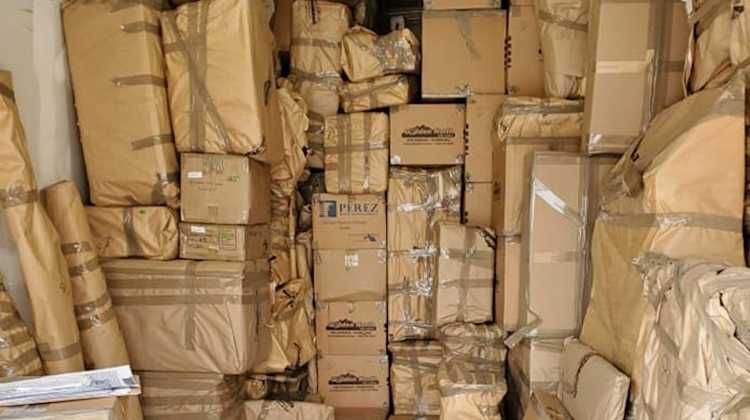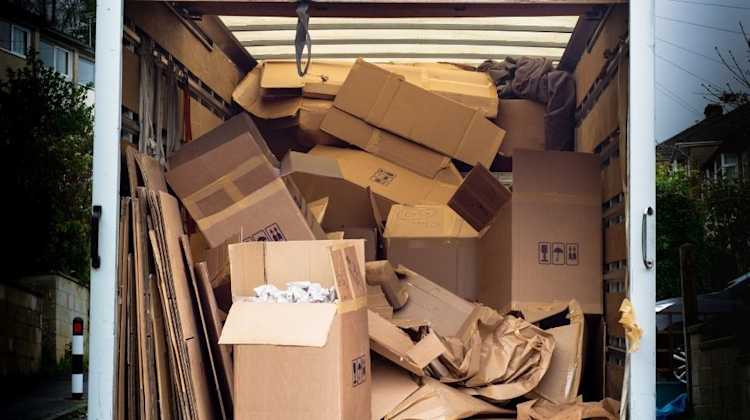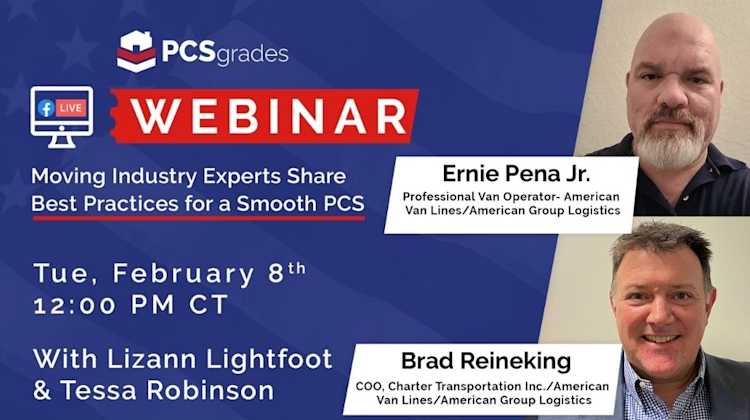Webinar: 2022 Moving Season with IAM
by Lizann Lightfoot - March 23rd, 2022

Our Guests:
Chuck White: President, IAM (International Association of Movers). I have been with the Association for 17 years, in the current position for 3 years, and before that, I was in the moving industry as a mover. I was an Army brat and went to 8 different schools before high school.
Dan Bradley: Director for Government and Military Relations at IAM. I was in the Air Force for 20 years, married and dragged up to 4 kids around during that time. I spent 8 years as a Department of the Army civilian, then joined IAM a few years ago. I ran the DoD’s Personal Property program during my final military assignment, so I have worked on the government and civilian side of the moving industry. The International Association of Movers handles both domestic and international moves, and we engage with the DoD on behalf of our movers.
Discuss the 2022 moving season with the International Association of Movers
During peak PCS season, is there an optimal time to move?
Chuck: If you’re moving in June or July, there may not be a sweet spot at all. Everyone is trying to move when school is not in session. The middle of the month may be the best time to move. In the beginning or end of the month is when leases end and everyone is trying to get out. The middle two weeks of any month may be best.
But if you can get your orders and book a move in early May, late April, end of August, or into September, then you are more likely to have a great experience because the summer is just a tough time for the entire industry. It’s corporate and residential movers too, all competing for the same space and the same equipment, drivers, crews, warehouses, etc.
2022 is going to be really interesting. Coming out of the pandemic, you all know we have seen issues with inflations, supply chain issues, the availability of labor. It’s going to be a challenging peak season.
As COVID restrictions are lifted, how will this impact the moving industry?
Dan: We are waiting on guidance from TRANSCOM and the DoD to see if any health protection protocols will be lifted. Some parts of the country have eased mask requirements, and this helps from a labor perspective trying to hire people who have to work all summer and may not have to wear masks anymore in the hottest season. We can be hopeful, but it’s going to be difficult to see any experience that’s very different from last year. We are still struggling to find drivers, packing crews, and availability this year. Everyone wants freight drivers right now, and there are not enough drivers to satisfy everyone. There are still impacts on the availability of wood, crating, and packing material, so movers can’t always get their hands on the supplies they need. Costs of everything is high--fuel, wood materials, labor, etc.
How can military families prepare to move successfully during peak season?
Chuck: It probably isn’t going to be better for a while, so get into your Transportation Office and get something on the books as soon as possible. The earlier the better, because there are a lot of limitations happening in the background that impact our flexibility. However, even getting orders and requests in early doesn’t guarantee a smooth process. There is still less labor and less maintenance, which can back up the logistics chain. There can still be frustrating impacts. But it’s certainly better than waiting until the last minute.
There is responsibility on both sides, and military families need to know how to be prepared for a move--having things clean and organized, having things set aside in a designated “Do Not Pack” area, etc. You have a responsibility to communicate with your movers, and they have a responsibility to tell you what is going on. It’s not bad to ask questions. Be involved, be an active participant. Those who are the most engaged usually have a better experience and more success.
Dan: It’s important to have the house tidy and the items clean before the move, so we aren’t trying to sort through things and risk making everything dirty and disorganized on the other side.
Are we better off doing DITY moves (Personally Procured Moves PPM)?
Chuck: Customer Satisfaction Survey (CSS) scores do show that 90% or more who use professional DoD movers are satisfied or higher with their moves. Moving yourself may be a good solution for someone unmarried or who doesn’t have much stuff. But if you are a family with several bedrooms full of household goods, you are probably better off using a mover.
However, if you are going to the internet and trying to find a qualified, certified moving company, you need to be very careful, because there are numerous “rogue movers” who are essentially criminals. Their goal is to give you a low price, then pack your goods, then hold them hostage and make you pay a lot more to get them back. Make sure you do your due diligence and know who these people are. The International Association of Movers is a resource. We have 2,200 member companies that are vetted through our processes, and the Mobility Exchange shows who are validated, vetted movers. We are planning to create a new website that will allow people to find the best of the best movers in the marketplace, so you know you are hiring someone reputable to handle your goods.
It is our understanding that the PPM reimbursement will continue to be at 100% for military families. As prices everywhere have increased, military families should not be asked to go back to the 95% reimbursement rate that we saw prior to the pandemic.
Actual Cost Reimbursement is not based on the cost of the move, but is based on actual out-of-pocket expenses based on certain difficult emergency situations, so ask your Transportation Office about that if it would apply to you.
Lizann: We appreciate that 100% reimbursement rate, because we are a large family who had to move ourselves during the pandemic. We did a hybrid version of a PPM: my husband and I did 100% of the packing and loading ourselves, but we rented an ABF trailer that was parked in front of our house for a few days, so we could take our time loading it, and then a professional driver came and picked up the trailer and drove it across the country for us. It was delivered to our destination just a day or so after we arrived, and then we unloaded it ourselves and put all our furniture together ourselves. So getting the full reimbursement rate made all that effort worthwhile. The downside of the PPM is that if you break your own stuff, you don’t get any claims or coverage for it.
What can you do while preparing to move to reduce the likelihood of claims?
Chuck: You can pack some of your things in advance, but if the moving company accepts it and moves it for you, they are liable for all your boxes and goods. So if you do pack something, don’t seal it. The moving company is allowed to open the box and inspect the goods to make sure it is covered and packed properly. As long as you allow the inspection, they are covered in the valuation.
Dan: Taking pictures won’t prevent any damages, but take lots of pictures before the move to have a sense of where things are in your house, and what things were grouped where. Be aware of grouping things together and organizing similar items. Be smart about how you handle things on the other side too-- understand the restraints of the DPS Claims System. They just did an update which is causing a lot of headaches for customers.
Chuck: Take pictures of everything. Keep a log in your phone. You don’t need to write it down, because you’ll get an inventory sheet, but the more images you take in advance, the better you will be able to recognize if something is missing.
Dan: Take the crew chief through the house, give them a tour, and make them aware of anything that is special, significant, or has an important meaning to you. Identify the items that are important and valuable to YOU.
Can you share any updates about the Global Households Goods Contract (GHC)?
Chuck: This is a paradigm shift that will change the industry and affect military families. They are moving from a process with 90+ Transportation Service Providers that have been vetted and approved by TRANSCOM, and we are now going to a Federal Acquisition Regulation Contract, and they are giving the entire program to one entity. There will be about 350,000 shipments annually. The DoD is the largest provider of household goods moves in the world!
In November 2021, the DoD awarded that contract to a company called HomeSafe. Two other companies bid against HomeSafe. Those other bidders protested to the Government Accountability Office, and about a week ago, both those protests were denied, which means the contract can move forward. There is about a 9 month transition period, and then the domestic move program would be impacted by this contract, so that would be late 2022. But, it looks like the two companies who had their protest denied can now continue to the Court of Federal Claims, which will determine if the contract was awarded appropriately. There could be a “stay” in the process, which would make everything stop until a court decision is made. We don’t know yet whether or not a “stay” will be granted, but if it is, then all transition plans stop. But otherwise, it will move forward and HomeSafe will plan to implement transition procedures probably in 2023.
I would encourage military families to understand that this is a significant shift. It can be successful, but the transition period has not really been developed yet. For the first four months, it will roll out with initially 25% of domestic shipments, then 50%, then 75%. We don’t know yet if that applies an entire base to one program or another, or if it will be piecemeal for different houses or neighborhoods. Everyone will wonder who to contact, and communication during the transition is what people should be paying attention to.
Will there be any policy changes this year or next year?
Dan: We’ve had significant changes over the past few years. One of the most difficult to understand for customers was the adjustment of the 7-Day Spread for picking up Household Goods. This year, it is now entered by the customer in the Pick Up No Later Than Date in their request form. It used to be that the 7-day spread started on the date they entered, and then the company had seven days after that date to pick up. Now, the industry will see the last date that you can finally move, and they can pick up goods any time in the 7-day window BEFORE that date on the form. That’s why move counseling is so important. You enter a Last Pickup Date and a Preferred Pickup Date, so that helps communication. Right now, they aren’t allowing changes outside of that window, unless it is initiated by the service member. Last year, a mover could make that change.
In the GHC, we are working on the concept of electronic inventory. The DoD has already told movers that they have every intent of implementing electronic inventory by May of 2023, regardless of where the GHC process is at that time. This is a big shift in the industry. Electronic inventory is software that instead of having everything scribbled on a paper sheet, it will all be done on an electronic screen, so you will be better able to read the condition codes. For a customer, you still have to electronically sign the sheets, and you should receive an electronic copy (a pdf by email) when the movers leave, and that can then be checked off on the other end. It should be easier to read because it won’t be hand-written notes anymore.
Chuck: We started getting reports of back-ups in the worldwide supply chain very early in the pandemic, so we did a white paper exploring supply chain disruptions in the moving industry and for all of us in the United States. We updated the info in April 2021, and then again a few weeks ago. Some of our offices are giving out this paper or the short accompanying video, to explain what it means for them and their shipments, and to better understand delays. You can view the Supply Chain information here.
Dan: One change we have seen is that the DoD has updated their transit times. No one was making timelines, so we have asked for those transit times to be updated. We provided data and some input on problematic goals even before the pandemic, but especially during, since there were fewer ships, lanes were being shut down, and there were freight problems in the U.S. They finally took a broad look at that and updated transit times to be more reasonable, so now the movers have a little more time, which means more deliveries will be on time instead of delivered late.






